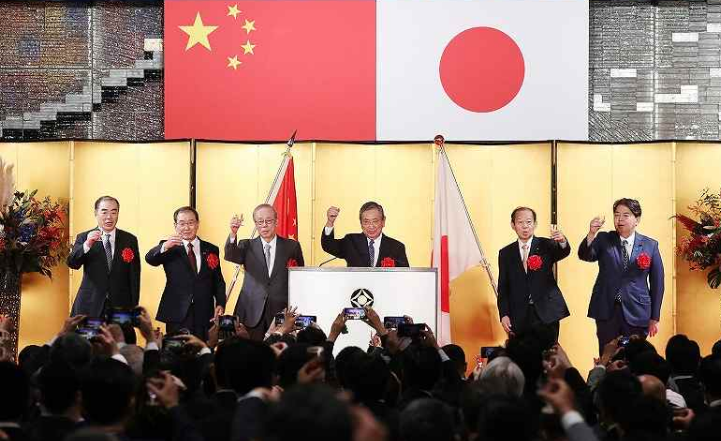PM spells out India’s position on China
I n a recent interview to Newsweek, the Prime Minister, discussing Indo-China relations, commented, “For India, the relationship with China is important and significant.
Tensions have cast a shadow over dialogue between the Japanese and Chinese leaders, and the realization of the “constructive and stable relationship” that both countries have sought is not in sight.

Jiji Press Toasting the 50th anniversary of diplomatic relations between Japan and China in Tokyo on Thursday are, from left, Chinese Ambassador to Japan Kong Xuanyou; Masakazu Tokura, chairman of the Japan Business Federation (Keidanren); former Prime Minister Yasuo Fukuda; Yohei Kono, former speaker of the House of Representatives; Toshihiro Nikai, former secretary general of the Liberal Democratic Party; and Foreign Minister Yoshimasa Hayashi.
With Japan and China marking 50 years since their 1972 normalization of diplomatic relations on Thursday, the two Asian neighbors now see their once-amicable ties changed to strained ones.
The days when friendship was based on bilateral economic ties have passed, and China, which has been expanding its military might against the backdrop of its growing national power, has repeatedly intimidated its neighbors.
Tensions have cast a shadow over dialogue between the Japanese and Chinese leaders, and the realization of the “constructive and stable relationship” that both countries have sought is not in sight.
Advertisement
Even so, Prime Minister Fumio Kishida and Chinese President Xi Jinping exchanged congratulatory messages on Thursday to mark the anniversary of the normalization of diplomatic ties.
In his message to Xi, made public at a commemorative event held in Tokyo on Thursday, Kishida said that the Japan-China relationship has various kinds of potential, but also faces many challenges and pending issues. He stressed that it is important for the two countries to create a new future for bilateral relations by remembering when Japan and China worked together for a normalization of diplomatic ties.
Meanwhile, Xi noted in his message to Kishida that China places great importance on the development of China-Japan ties and that he intends to lead the drive to build a relationship that meets the needs of a new era.
However, Kishida decided not to attend the commemorative event and Foreign Minister Yoshimasa Hayashi attend, representing the government instead. Kishida apparently considered it premature for him to attend the event given that there are many pending issues between the two countries and a festive mood is lacking.
Japan and China normalized diplomatic relations with the signing of a joint communique on Sept. 29, 1972. Beijing then went on to achieve rapid economic growth by capitalizing on Japanese investments and technologies. In the early 2000s, political relations cooled due to historical perception issues, but economic cooperation deepened, leading to ties that are often described as “politically cool and economically hot.” However, China, which overtook Japan in gross domestic product in 2010, began to increase its hegemonic behavior.
In recent years, China’s maritime expansion has intensified, and moves by China Coast Guard vessels have become common around the Senkaku Islands in Okinawa Prefecture. According to the Japan Coast Guard’s 11th regional headquarters in Naha, three ships entered the territorial waters off the islands early Wednesday and the Japanese government subsequently lodged a protest.
It appears necessary for the two countries to have dialogue to avoid confrontation, but Kishida has not held a face-to-face meeting with Xi, having only spoken with him on the phone in October last year shortly after assuming office.
On Wednesday, Chief Cabinet Secretary Hirokazu Matsuno met with Wan Gang, vice chairman of the Chinese People’s Political Consultative Conference National Committee, who visited Japan to attend the state funeral of former Prime Minister Shinzo Abe, at the Prime Minister’s Office.
Matsuno told him that there is “a common understanding between the prime minister and President Xi to build constructive and stable Japan-China relations.” In response, Wan said that the sending of the delegation he was leading to Japan this time “is an indication that China attaches importance to China-Japan relations and the Kishida administration.”
The focus for now will be on whether talks between Kishida and Xi will be held in conjunction with such occasions as the Group of 20 summit in November, but China’s next move is unclear.
Advertisement